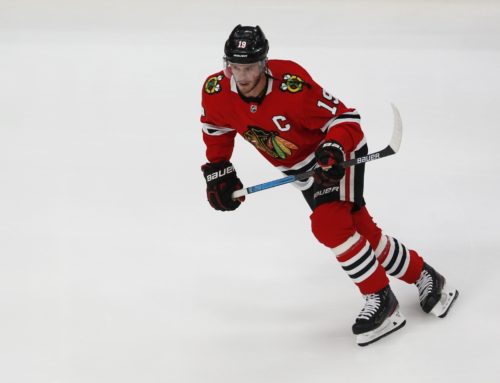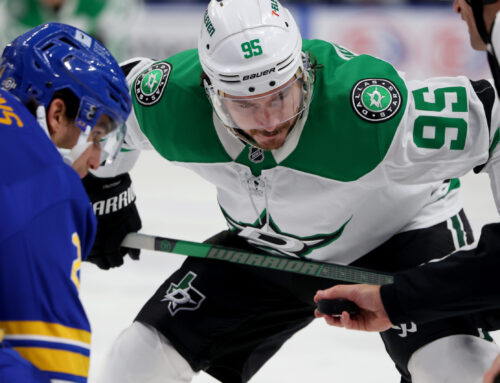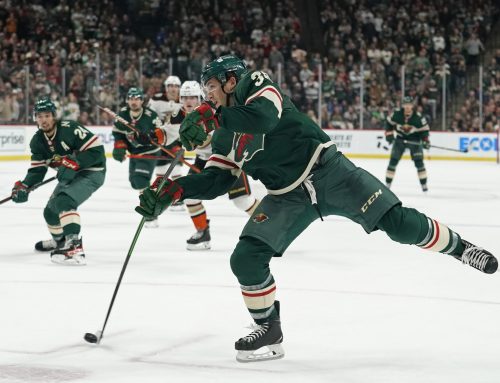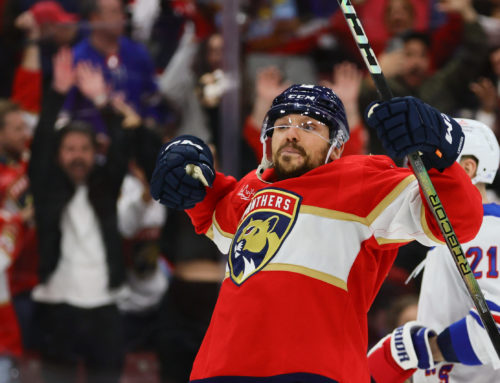With a 3-2 win over the Rangers in Game 5, the Florida Panthers are one win away from a return trip to the Stanley Cup Final.
The Rangers and Panthers will now head to Florida for Game 6 on Saturday evening, where the Rangers will try to avoid elimination in front of a hostile crowd that was… half filled with Rangers fans in Games 3 and 4?
All kidding aside, the Panthers are a nasty piece of business right now. If they make it to the Stanley Cup Final, they will be a tough team to bet against. This Sam Bennett empty-net goal, which turned out to be the game-winner, personifies the type of game that the Panthers play. Bennett elbows Mika Zibanejad to get the puck before skating down the ice to score the empty-netter, and then he is more than prepared to be hit by Chris Kreider.
Bennett also did what he does best for fantasy teams, which is fill multiple categories. Bennett finished with a goal and an assist, a plus-2, five shots, and three hits. He now has goals in back-to-back games and three goals in the series.
Gustav Forsling scored the Panthers' first goal, which is his second goal and fourth point of the series. That is notable because he has as many 5-on-5 points as anyone in this series.
That contract is for eight years at $5.75 million per season, starting next season. It looks like a great deal at the moment.
Anton Lundell's goal midway through the third period broke a 1-1 tie. Lundell has upped his scoring in the playoffs with 11 points in 16 games, a much higher scoring pace (0.69 PTS/GP) than he had in the regular season (0.45 PTS/GP). He's only 22 years old, so it's much too early to assume he will top out as a checking forward.
Kreider's shorthanded goal opened the scoring in this game. The goal was his first point of the series after he registered a hat trick in the Game 6 series clincher against Carolina. Kreider also assisted on the Rangers' other goal, with Zibanejad assisting on both goals. The assists were also Zibanejad's first two points of the series.
Alexis Lafreniere scored the Rangers' other goal late in the third period to make it 3-2. Unlike Kreider and Zibanejad, Lafreniere has been scoring consistently during this series. Lafreniere has four goals in the past three games, also averaging over four shots per game over that three-game span.
Despite being just one goal shy of 50 during the regular season, Artemi Panarin has had trouble putting the biscuit in the basket lately. The Bread Man now has an eight-game goal drought dating back to Game 4 of the Carolina series.
Filip Chytil was back in the Rangers' lineup for Game 5, while Blake Wheeler was scratched. Kaapo Kakko remained in the Rangers' lineup for this game, even though he has just two points in 14 playoff games and no points over his last six games.
This is not an incredible run of Game 5s in the Conference Final for the Rangers.
–
Jaccob Slavin was named the winner of this year's Lady Byng Trophy. Slavin registered just four minor penalties in 81 games this season, which is an impressive feat for a defenseman. In his nine NHL seasons, Slavin has a career high of 18 penalty minutes. This is Slavin's second Lady Byng Trophy.
–
Last week I discussed Zero G from the perspective of two of my teams, which you can read about in the Saturday Ramblings and Sunday Ramblings. If you're tired of Zero G by now, I have only one more team to discuss. If you've been following along, I did not make Zero G the focus for this next season, and you'll find out why and whether it worked.
Team 3: Not Zero G Focused
This is a head-to-head total points league with 12 teams. W, GA, SV, and SHO are the goalie categories that are counted. This was an invitational league with a group of experts from various websites and even YouTube channels.
I abandoned Zero G in this draft early on, figuring Connor Hellebuyck at pick 34 was solid value. After all, one of my league mates was Nate from Apples & Ginos, who first documented the Zero G strategy. In other words, I decided to zag when I knew that others would zig.
(By the way, Mike’s post isn’t about the same league. But it explains exactly what I was thinking in this draft.)
Overall, I couldn't have received better results from any other goalie, as Hellebuyck was the goalie with the highest number of points in addition to being the current favorite for the Vezina Trophy. It could have just as well gone sideways, though. Goalies drafted before Hellebuyck included Igor Shesterkin, Ilya Sorokin, and Jake Oettinger, while Alexandar Georgiev was drafted shortly after. None of these were terrible enough to sabotage an entire season, although week-by-week results varied.
As reliable as Hellebuyck was during the regular season, he let me down during the fantasy playoffs. During that week, he won one game and lost two more, but finished with a very un-Hellebuyck-like 4.02 GAA and .882 SV%. At least those numbers were better than his real-life playoff numbers, which were 5.01 GAA and .870 SV% in the first round against Colorado. Still, I lost my first-round head-to-head playoff matchup by a slim margin, officially finishing sixth in the league standings.
Trusting a goalie for a large sample that is an entire season is one thing. Trusting a goalie to win you just one week – but a very important week – can be risky. The schedule, injuries, or just an overall cold stretch can affect results. That's why getting on top of things with the hot goalie stream for a week or two might be the better approach for the fantasy playoffs. That being said, you sink or swim with your stars during the fantasy playoffs.
The only other goalie I drafted for this team was Linus Ullmark in the 11th round at pick 130. I was honestly surprised that I could draft Ullmark that late. He proved to be solid value here, as the defending Vezina Trophy winner was a Zero G target of mine for the second straight season. Ullmark obviously did not perform as well as he did in his Vezina season, and he was splitting starts with Jeremy Swayman again. Yet Geek of the Week writer Ryan Brudner agreed that Ullmark was more valuable than Swayman during the regular season, even though the latter was starting in the playoffs.
I also added Pyotr Kochetkov from waivers as a third goalie for much of the season, and he provided tremendous value while Frederik Andersen was out of the lineup. Kochetkov's availability proved that finding goalies was relatively easy in this league. Assuming this league is back for next season, I will try to draft a goalie where it makes sense, although I doubt it will be in the third round again.
By the way, Nate from A&G won the league. The goalies he drafted were the twin towers of Philipp Grubauer (14/167) and Joonas Korpisalo (15/170). Obviously, he went full Zero G, as this was a 17-round draft. The goalies he finished the season with Korpisalo, Andersen (who was on the waiver wire from November to March, which mirrored the time he was out of action), and Charlie Lindgren (who was on another winning team that I identified previously).
Overall, adopting a Zero G strategy takes courage. It also involves the breaking of old habits. Starting goalies are a scarce commodity in leagues, while there's an unlimited supply of forwards and defensemen. Being thin at a certain position after a draft isn't a good feeling.
Yet with scoring on the rise the last few seasons, goalies have become more unpredictable. Subpar goaltending can ruin your season, with a greater opportunity cost if a goalie is drafted too early. What I'd ultimately like to see is less variance between goalie ADPs in drafts going forward. With goaltending categories taking up a significant portion of many leagues, that will be a challenge as teams won't want to be left in the cold and will still lean toward drafting a goalie early. Just remember that Zero G isn't about ignoring goaltending completely – it's more about searching for value later in your draft.
Perhaps the way to think of this is that drafting the wrong goalie early is a greater risk to your team than waiting until later to draft a lower-performing goalie. At least in the latter scenario, you are in a better position to justify shifting to a hot waiver-wire goalie early in the season, or even adopting a matchup-based strategy using fringe goalies until you find one that sticks. At least then you're paying closer attention to goalie performance than being surprised when your "set and forget" option is underperforming.
Finally, check back late in the season before your fantasy playoffs, assuming that you're in them. If you're goaltender is slumping or simply not starting, find a way to move on. Add that hot goalie, or look for backup goalies with favorable matchups that could start more often down the stretch.
–
Follow me on X @Ian_Gooding and Threads.





 SEA
SEA NYI
NYI BUF
BUF DAL
DAL CBJ
CBJ STL
STL L.A
L.A NYR
NYR ANA
ANA
